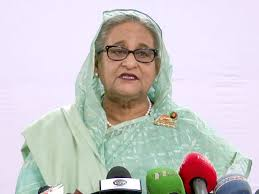
Table of Contents
Introduction
In recent weeks, political tensions have escalated in Bangladesh, as the Bangladesh Nationalist Party (BNP) has expressed strong disapproval of Prime Minister Sheikh Hasina’s visit to New Delhi. The BNP’s criticism centers on their belief that Hasina’s stay in the Indian capital will be perceived unfavorably within Bangladesh. This analysis explores the BNP’s perspective, the implications for Bangladeshi politics, and the broader regional dynamics at play.
The BNP’s Stance
The BNP, a major opposition party in Bangladesh, has been vocal in its criticism of Prime Minister Sheikh Hasina’s foreign policy, particularly her relationship with neighboring India. The party argues that Hasina’s visit to New Delhi, which involved high-level meetings with Indian leaders, will be viewed negatively by the Bangladeshi populace. They assert that this visit underscores a troubling closeness between the ruling Awami League and India, which they claim compromises Bangladesh’s sovereignty and national interests.
The BNP’s criticism is grounded in a broader narrative of nationalistic sentiment that views India with suspicion. The party suggests that Hasina’s diplomatic engagements with India may be seen as concessions that undermine Bangladesh’s autonomy. They argue that such visits often come at the expense of key national interests and have historically resulted in unfavorable agreements for Bangladesh.
Historical Context
To understand the BNP’s position, it’s essential to consider the historical context of Bangladesh-India relations. Since gaining independence in 1971, has maintained a complex relationship with its larger neighbor. While there have been periods of cooperation and mutual benefit, there have also been tensions, particularly regarding issues like border disputes, water sharing, and trade imbalances.
The BNP’s criticism is also reflective of past political dynamics. During the BNP’s tenure, there were instances of strained relations with India, and the party’s stance often involved a cautious or even adversarial approach towards Indian policies. In contrast, the Awami League, under Sheikh Hasina, has pursued a more cooperative relationship with India, emphasizing economic and infrastructural collaboration.
Public Perception and Political Implications
The BNP’s concern about public perception is not unfounded. In , there is a segment of the population that harbors skepticism towards India, influenced by historical grievances and nationalistic sentiments. The BNP seeks to capitalize on these sentiments by framing Hasina’s visit as a betrayal of Bangladeshi interests.
Moreover, the opposition party argues that Hasina’s close ties with India might lead to policies that favor Indian interests over Bangladeshi needs. They point to recent agreements or joint ventures that, according to their view, disproportionately benefit India. The BNP’s criticism thus aims to rally public opinion against the current government by highlighting perceived threats to national sovereignty.
Impact on Domestic Politics
The BNP’s strategy reflects a broader attempt to position itself as the defender of Bangladeshi sovereignty and national pride. By criticizing Hasina’s visit, the BNP is likely trying to galvanize its base and attract voters who are disillusioned with the ruling party’s foreign policy. The party’s stance may also resonate with those who feel that the current administration is compromising national interests for the sake of international relations.
However, this strategy carries risks. If the public perceives the BNP’s criticism as overly nationalistic or lacking in constructive policy alternatives, it could backfire. The ruling Awami League might counter these criticisms by emphasizing the economic and diplomatic benefits of a strong relationship with India, presenting their foreign policy as a strategic asset rather than a liability.
Regional Dynamics
The tension between the BNP and Hasina’s government also plays into broader regional dynamics. India, as a significant player in South Asia, has a vested interest in maintaining stable and cooperative relations with its neighbors. For India, a stable is crucial for regional security and economic growth. Hasina’s visit to New Delhi is part of a broader strategy to strengthen these ties and secure support for various developmental and infrastructural projects.
The BNP’s criticism, therefore, must be understood in the context of regional geopolitics. The party’s stance may affect not only domestic politics but also the diplomatic relationship between Bangladesh and India. A more strained relationship could have implications for regional cooperation on issues like security, trade, and infrastructure development.
Conclusion
The BNP’s reaction to Prime Minister Sheikh Hasina’s visit to New Delhi reflects deep-seated political and nationalistic sentiments in Bangladesh. By portraying the visit as detrimental to Bangladeshi interests, the BNP aims to challenge the ruling party’s foreign policy and rally support for its own political agenda. However, this approach also risks alienating voters who see value in strong Bangladesh-India relations.
As navigates its complex relationship with India, the domestic political landscape will continue to be influenced by how these international engagements are perceived. The ongoing debate highlights the broader struggle between national sovereignty and international diplomacy, a theme that will likely remain central in Bangladeshi politics for the foreseeable future.









